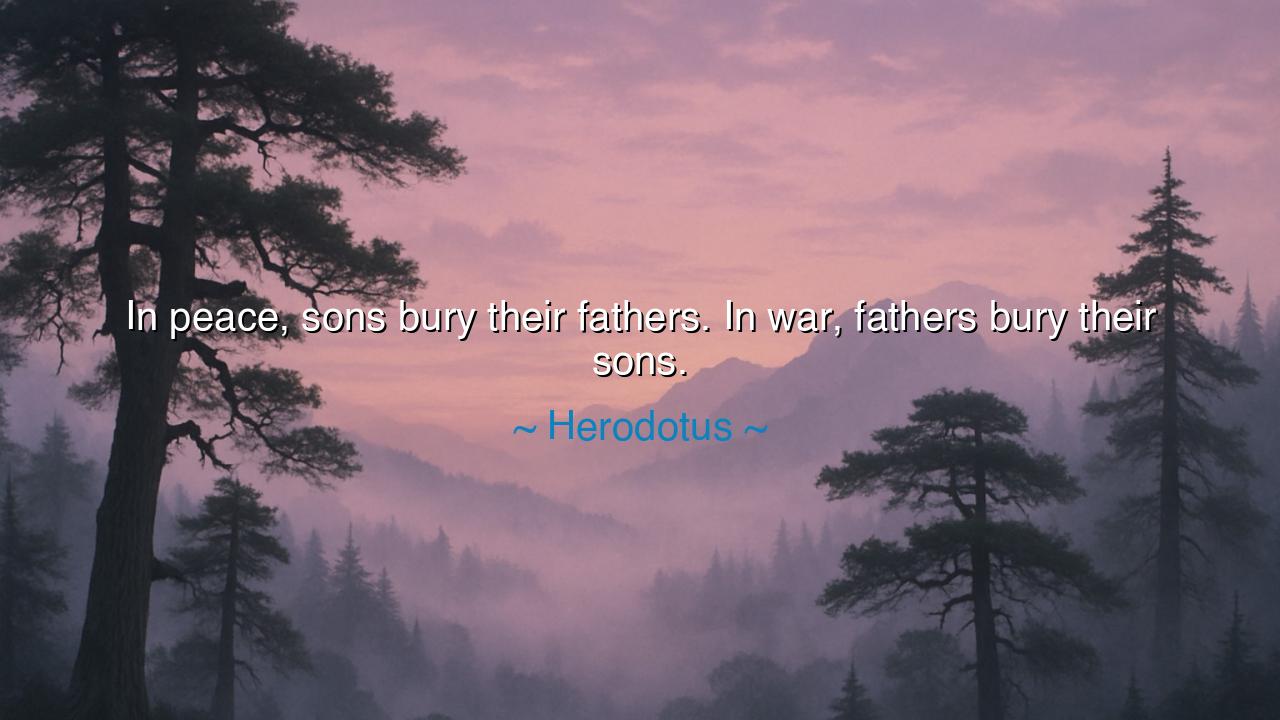
In peace, sons bury their fathers. In war, fathers bury their






“In peace, sons bury their fathers. In war, fathers bury their sons.” Thus spoke Herodotus, the Father of History, whose eyes witnessed the rise and fall of empires, whose ears heard the cries of both the victor and the vanquished. This saying is not merely a reflection upon death, but a lamentation upon the disruption of the natural order. For in the harmony of peace, life flows as it should: the old give way to the young, the torch of existence passes hand to hand, and the rhythm of generations remains unbroken. But in the chaos of war, that rhythm is shattered, and time itself recoils. The young, who should have carried forward the hopes of tomorrow, are swallowed in the earth before their hour, leaving fathers weeping over graves that should never have been dug.
Consider the weight of the words. The fathers, hardened by years, expect the duty of burial, for they have carried the burdens of life long enough to await death. The sons, fresh with strength, are meant to inherit the world, to cultivate its fields, to defend its walls, to raise their own children in due season. But war is a thief, a cruel god that devours the young, leaving the old bereft. What greater sorrow can a man bear than to outlive the blood of his own loins? Thus Herodotus’ teaching pierces deeper than any sword. It is not only the loss of individuals—it is the loss of continuity, of memory, of the very future.
History offers many examples of this truth. Think of the Peloponnesian War, when Athens and Sparta turned their spears upon each other. The cemeteries filled not with gray heads but with youths in their prime, their mothers’ milk scarcely dried from their lips. In every home, fathers who should have received honor in old age instead received grief. Or recall the fields of World War I, where Europe’s flower of youth was cut down in the trenches. Countless villages were left without heirs, entire families extinguished, because fathers lived to bury sons who never returned from Flanders, Verdun, or the Somme. These wars did not simply spill blood—they unstitched the very fabric of civilization.
Yet amidst the grief, there is also a warning for future generations. Herodotus, wise in his simplicity, reminds us that the natural order is a fragile gift. To maintain peace is not merely to avoid bloodshed—it is to preserve the rhythm of life, where the old pass with dignity and the young rise in strength. In peace, sorrow follows the order of nature. In war, sorrow defies it, twisting the world into tragedy. Thus, leaders and peoples alike must weigh the cost of their quarrels, for every war begins with banners and ends with funerals.
The lesson is clear: seek peace, not because one fears death, but because one honors life. Let the ambition of rulers be tempered by the memory of fathers bent in mourning. Let the pride of nations be humbled by the image of sons fallen before their time. To those who inherit the earth, remember: the true hero is not always the one who conquers in battle, but the one who preserves harmony, ensuring that generations rise and fall in their rightful order.
For the individual, too, this wisdom speaks. Live so that your hands sow seeds, not graves. Labor for the flourishing of your children and your community. Guard against the passions—anger, envy, greed—that kindle wars in the hearts of men. Even in daily life, strive for reconciliation, for every quarrel left unchecked is but a seed of greater conflict. Preserve your home as a haven of peace, so that you may hand to your children not the ashes of strife, but the light of life.
If ever you are tempted to glorify war, recall the image of the father by the graveside of his son, his heart hollowed by grief. Ask yourself whether the cause for which men fight can balance that sorrow. And if you answer no, then guard the peace with all your strength. For Herodotus speaks not only of the past, but of every age to come, until the end of time.
Thus, let the teaching be etched into your soul: in peace, the cycle of life flows as the river, steady and natural; in war, the river floods its banks and drowns the very future. Choose peace, that sons may one day bury their fathers with tears of love, not fathers bury their sons with cries of despair. Guard the natural order, cherish peace, and honor life.






AAdministratorAdministrator
Welcome, honored guests. Please leave a comment, we will respond soon